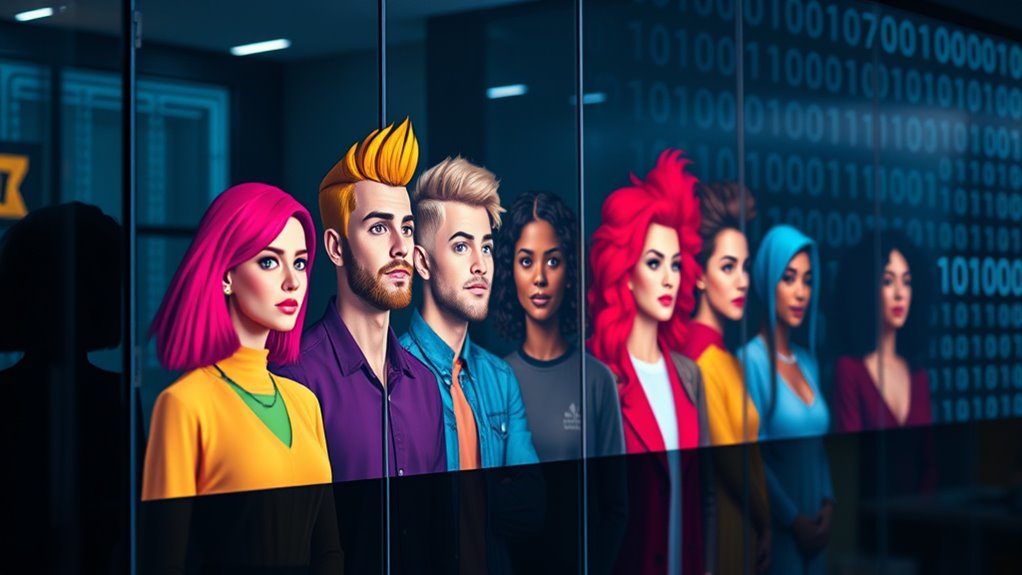AI-generated personas can be a helpful shortcut for targeted marketing and creating personalized experiences, making your campaigns more relevant and engaging. However, they also risk oversimplifying identities, reinforcing stereotypes, and raising ethical concerns about privacy and representation. Balancing automation with authentic, culturally sensitive interactions is essential to build trust and genuine connections. To explore how to leverage AI personas responsibly while maximizing benefits, keep exploring the key considerations in this evolving landscape.
Key Takeaways
- AI-generated personas can efficiently target niche audiences but risk reinforcing stereotypes if not carefully managed.
- They enable personalized marketing, yet oversimplification may lead to superficial engagement and misrepresentation.
- Ethical practices and cultural sensitivity are essential to prevent biases and ensure authentic, diverse portrayals.
- Over-reliance on automation might reduce genuine human connection, impacting trust and long-term loyalty.
- Responsible use with transparency and continuous oversight can maximize benefits while minimizing risks of oversimplification.
The Rise of AI Personas in Modern Marketing

As digital marketing continues to evolve, AI-generated personas are becoming an essential tool for targeting and engaging audiences more effectively. They allow you to capture persona diversity by creating detailed profiles that reflect various demographics, behaviors, and preferences. This helps you tailor your messaging to resonate with different segments. Additionally, AI personas can incorporate cultural sensitivity, ensuring your campaigns respect and acknowledge diverse cultural backgrounds. This reduces the risk of miscommunication or offending your audience. As a result, AI-generated personas enable you to develop more inclusive marketing strategies that connect authentically with a broader spectrum of consumers. By leveraging these advanced tools, you can improve engagement and foster stronger relationships with your target audiences. Furthermore, understanding the importance of emotional support can help marketers craft messages that resonate on a deeper level, fostering trust and loyalty.
Advantages of Using AI-Generated Profiles

Using AI-generated profiles offers several key advantages, making them a valuable asset in modern marketing strategies. They enable you to craft more compelling and targeted messages through creative storytelling, resonating deeply with specific audiences. These profiles also enhance cultural representation by capturing diverse perspectives, helping you avoid biases and reach broader demographics. AI-driven personas can be created quickly and updated easily, saving time and resources while maintaining relevance. This agility allows you to test different narratives and refine your approach based on data insights. Additionally, leveraging AI in Business can improve the accuracy and effectiveness of your personas, ensuring they reflect real-world dynamics. Ultimately, AI-generated profiles empower you to connect authentically with your audience, fostering engagement and loyalty through personalized, culturally aware content. They streamline your marketing efforts, making campaigns more effective and inclusive.
Risks of Stereotyping and Oversimplification

While AI-generated profiles can enhance marketing efforts by providing targeted and culturally diverse insights, they also carry the risk of reinforcing stereotypes and oversimplifying complex identities. Cognitive biases in data can lead AI systems to perpetuate cultural stereotypes, reducing individuals to narrow traits that overlook their full complexity. These biases often stem from training data that reflect societal prejudices, unintentionally embedding these distortions into AI profiles. As a result, you might unknowingly promote reductive views, reinforcing harmful assumptions about groups based on race, gender, or culture. Such oversimplification can undermine your efforts at genuine engagement and inclusivity. Recognizing these risks is essential to avoid perpetuating stereotypes and to ensure your use of AI remains ethical and respectful of individual diversity. Additionally, understanding the Gold IRA process and associated risks can help prevent misinformed decisions that may lead to financial losses or exposure to scams.
Ethical Concerns and Human Dignity

You need to consider how AI-generated personas can impact personal identity and respect for individuals. If these personas reduce people to stereotypes, it risks dehumanizing them and stripping away their dignity. It’s vital to question how we balance innovation with the fundamental respect every person deserves. Additionally, understanding the importance of dog names can serve as a reminder of the significance of personalized and culturally meaningful identifiers.
Respecting Personal Identity
How can AI-generated personas respect personal identity and uphold human dignity in an era of rapid technological advancement? You need to prioritize identity preservation by ensuring AI models accurately reflect individuals’ authentic traits without distortion. Cultural sensitivity is equally essential; AI should be programmed to recognize and honor diverse backgrounds, avoiding stereotypes or misrepresentations. Respecting personal identity means designing personas that acknowledge unique experiences and values, rather than reducing individuals to oversimplified profiles. When you focus on these principles, AI can support genuine interaction without compromising human dignity. By emphasizing respectful, accurate representations, you help foster trust and prevent the dehumanization that can occur when people feel misunderstood or misrepresented by automated systems. Incorporating Cultural sensitivity into AI development ensures a broader understanding of diverse identities and prevents harmful biases.
Risks of Dehumanization
AI-generated personas hold great promise for enhancing interactions, but they also pose significant risks of dehumanization that threaten human dignity. When these personas lack emotional depth, they can feel superficial or manipulative, reducing genuine human connection. Without careful attention to cultural sensitivity, they risk reinforcing stereotypes or misrepresenting diverse perspectives, which can alienate users and diminish respect for individual identities. Over-reliance on simplified personas might lead you to overlook the complex, nuanced nature of real human experiences. This reduction to sanitized or stereotyped representations can undermine empathy and ethical standards, making interactions feel less authentic. To preserve human dignity, it’s essential to develop AI personas that respect emotional complexity and cultural diversity, ensuring they accurately reflect human diversity and genuinely support meaningful engagement.
Impact on User Engagement and Personalization

AI-generated personas notably enhance user engagement and personalization by enabling platforms to craft more targeted and relevant experiences. When users feel understood through tailored content, they develop a stronger emotional connection, which encourages them to spend more time interacting with the platform. This sense of personalization fosters trust and satisfaction, making users more likely to return. As engagement deepens, user loyalty increases, creating a cycle of ongoing interaction. Additionally, understanding safety features and energy consumption can help tailor recommendations that align with user priorities for comfort and efficiency. However, while personalization boosts engagement, it also risks oversimplifying user needs or relying on stereotypes. If not managed carefully, these personas can create a false sense of understanding, potentially undermining genuine connection. Ultimately, AI-generated personas can substantially impact engagement and loyalty, but they must be used thoughtfully to avoid superficial interactions.
Balancing Automation With Authenticity

As you incorporate AI-generated personas, it’s essential to keep interactions genuine and relatable. You also need to prioritize ethical practices to build trust and respect user privacy. Finally, preserving each persona’s unique voice guarantees authenticity remains at the heart of your automated efforts. Considering the importance of electric dirt bike horsepower can help tailor more accurate and engaging personas for off-road enthusiasts.
Maintaining Genuine Interactions
While automation offers efficiency and consistency, maintaining genuine interactions requires careful attention to authenticity. You need to prioritize emotional authenticity, ensuring that responses reflect real empathy and understanding. Automated systems can sometimes feel cold or impersonal, risking a disconnect with your audience. To foster human connection, incorporate personalized touches that demonstrate you truly understand their needs. Avoid relying solely on scripted replies; instead, blend automation with opportunities for genuine engagement. By doing so, you show that your interactions aren’t just mechanical but rooted in real concern. Remember, authentic interactions build trust and loyalty, which automation alone can’t fully achieve. Striking this balance ensures you maintain meaningful relationships while benefiting from technological efficiency. Incorporating personalized content can help bridge the gap between automation and genuine interaction.
Ensuring Ethical Use
Balancing automation with authenticity requires a strong ethical foundation to prevent deception and maintain trust. You must address privacy concerns by safeguarding user data and being transparent about how AI-generated personas are created and used. Respect for cultural sensitivity is vital; avoid stereotypes and guarantee your personas reflect diverse backgrounds accurately. Always consider the potential impact on users, and avoid misrepresenting real individuals or manipulating emotions unethically. Implement clear guidelines for ethical AI deployment, and regularly review your practices to prevent misuse. By prioritizing privacy and cultural awareness, you affirm your automation efforts enhance authenticity without compromising integrity. This approach helps build trust with your audience and safeguards your reputation as you navigate the ethical landscape of AI-generated personas. Additionally, understanding the importance of Hackathons can foster innovation and collaborative problem-solving within your organization, supporting ethical development and deployment of AI solutions.
Preserving Unique Voices
How can you guarantee that AI-generated personas preserve the distinct voices that make real individuals and communities unique? The key lies in prioritizing cultural sensitivity and linguistic diversity during development. You must assure that algorithms are trained on diverse data sets that reflect different backgrounds, dialects, and worldviews. This approach helps capture authentic nuances, avoiding stereotypes or oversimplifications. Incorporating ongoing human oversight allows adjustments that respect individual voices and cultural contexts. By consciously designing AI systems with these principles, you maintain authenticity and prevent homogenization. Balancing automation with a genuine commitment to diversity ensures that AI-generated personas authentically represent the richness of real communities, safeguarding their unique identities while enhancing engagement and understanding.
Future Perspectives and Best Practices

As AI-generated personas become more integrated into various industries, establishing clear best practices is essential for ensuring ethical and effective use. You should focus on transparency, clearly communicating how personas are created and used, to foster trust. Embrace future collaboration by involving multidisciplinary teams—including ethicists, designers, and users—to develop guidelines that prevent oversimplification and bias. Keep pace with technological advancements, continuously updating protocols to leverage new tools responsibly. Prioritize data privacy and consent, ensuring personas don’t compromise individual rights. By setting standards now, you can help shape a future where AI-generated personas enhance decision-making without sacrificing ethical principles. Thoughtful implementation will maximize benefits while minimizing risks, guiding AI’s evolution toward responsible, innovative applications.
Frequently Asked Questions
How Do AI Personas Influence Consumer Privacy Rights?
AI personas impact your data privacy by collecting and analyzing personal information, which raises ethical concerns. You might not realize how much data is being gathered or how it’s used, risking your privacy rights. Companies may prioritize marketing or profit over protecting your data, so you should stay informed and cautious. AI personas can improve experiences but also pose significant ethical concerns regarding transparency and consent, affecting your trust and privacy.
Can Ai-Generated Profiles Replace Human Market Research Entirely?
You might think AI-generated profiles can fully replace human market research, but they often lack emotional authenticity, which is essential for understanding genuine consumer feelings. While AI can rapidly analyze data and help mitigate bias, it can’t capture nuanced human experiences or cultural subtleties. Relying solely on AI profiles risks oversimplification, so combining human insights with AI’s strengths offers a more thorough, authentic approach to understanding your market.
What Legal Regulations Govern the Use of AI Personas?
You might think the laws around AI personas are simple, but they’re more like a maze of privacy policies and data governance rules. These regulations aim to protect your personal info from being exploited or mishandled. You’re responsible for ensuring AI use aligns with laws like GDPR or CCPA, which set strict standards for data privacy and transparency. Ignoring these rules could lead to serious legal trouble, so stay informed and compliant.
How Do AI Personas Impact Cultural Diversity and Representation?
You should consider how AI personas influence cultural diversity and representation. They can reinforce cultural stereotypes, making certain groups appear one-dimensional or misrepresented. This often results in representation bias, where minority voices are underrepresented or mischaracterized. As a user, you need to be aware of these issues, ensuring AI tools promote authentic, diverse portrayals rather than perpetuating harmful stereotypes or oversimplified cultural images.
Are There Long-Term Psychological Effects of Interacting With AI Personas?
Imagine forming an emotional attachment to an AI persona like a childhood teddy bear—comforting, but potentially limiting. Interacting with AI personas can influence your emotional bonds and shape your identity development over time. Long-term, this may lead to shifts in self-perception or reliance on virtual companionship, affecting your mental health. While some find solace, others risk emotional dependency, making it vital to understand these psychological effects.
Conclusion
As you navigate the maze of AI-generated personas, remember they’re like maps—helpful guides but not the entire landscape. They can streamline your journey, but beware of the pitfalls of oversimplification and stereotypes. Aim for a balance where technology enhances authenticity without stripping away human dignity. By doing so, you’ll craft connections that feel genuine, turning automation into a bridge rather than a barrier—transforming data into meaningful human stories.









